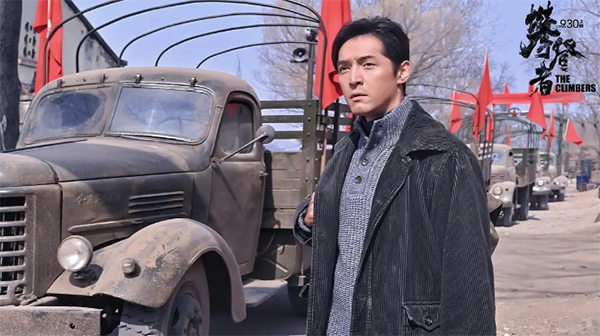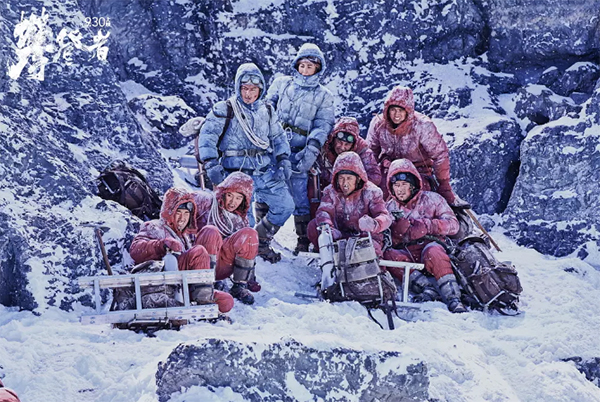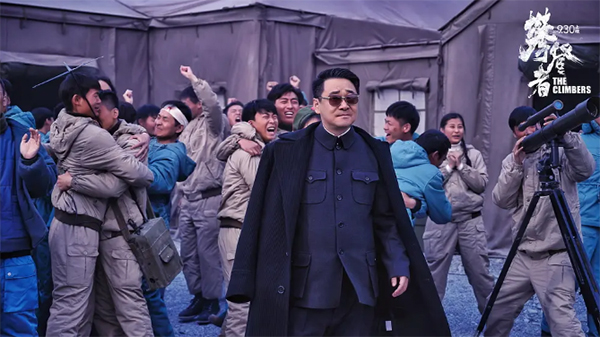
Editor's Note: Recently, the Central Propaganda Department announced the list of winning works of the 16th "Five One Project".
Among them, the TV series "Meritorious Service" and other works won the "Special Award"; the films "Miracle Stupid Child", "The Climber", TV series "The World" and "Transcendence" and other works won the "Excellent Work Award", achieving the "Grand Slam" of the TV series category , creating the best achievement in history; the Propaganda Department of the Shanghai Municipal Party Committee won the "Organization Work Award".
There is no doubt that "The Climber" is a main theme movie. Compared with the main theme movies in the traditional sense, it shows obvious heterogeneity. But perhaps it should be said that the definition of the main theme movie should have been changed long ago.

The Climber poster
The poster of "The Climber" has gone from pursuing big productions, big scenes, and an all-star lineup, to creating exciting plots and commercial elements, to the display of human nature and human feelings in "The Climber" today. It can be said that the connotation of the main theme movie has changed. Unknowingly transmuted several times. Judging from the several works in the National Day file, the figure of the main theme movie may be softer in the future. This situation of diversified development is undoubtedly a great advantage for Chinese films.
Back to The Climber. The first few scenes of the film were handled quite neatly, and the dramatic conflict was pushed to a climax in just a few minutes, which made people's eyes shine. The summit was successfully reached fifteen years ago, but the camera fell, and key evidence of the summit was missing. So, did you reach the top that year? The doubts from the outside constitute the motivation for the protagonists Fang Wuzhou, Qu Songlin and others to challenge Mount Everest again.


"The Climber" stills
This contradiction contains two meanings. One is damage to national dignity, and the other is unsatisfactory personal life. The screen of the movie shows that Fang Wuzhou has changed from a mountaineer to a boiler worker, but the subtext is that the power of the country is suppressed. Thus, the individual and the whole become one at this moment. It can be said that the tone of the whole movie is established. The love between Fang Wuzhou and Xu Ying belongs to the individual, but the ideal they pursue together belongs to the country. In the same way, the relationship between Li Guoliang and Hei Mudan that failed to blossom and bear fruit belongs to individuals, and the mountaineering career they devoted themselves to belongs to the country. The misunderstanding and reconciliation between Qu Songlin and Fang Wuzhou belong to the brotherhood of the two, but the basis for the two protagonists to consider the problem is not the individual. Yang Guang lost a leg because of taking care of a female doctor. This is a personal quality and a manifestation of collectivism.
It is not difficult to see that the main theme movies are constantly narrowing the focus, avoiding excessive grand narratives, and replacing them with delicate personal emotional displays. The use of this artistic method makes it easier to find a carrier for the audience's feelings, and will not make the film fall into the dilemma of empty preaching.
But this method also created new problems for "The Climber". First of all, Fang Wuzhou played by Wu Jing is too dazzling, and his performance in this film is almost "invincible". Going up to the sky, supporting the sky with one pillar, turning the tide repeatedly, showing that his good skills are true, but it is also an indisputable fact that he also robbed his teammates. Rather, it's because the director didn't handle the proportion of group play and one-man show well.

"The Climber" stills
Stills from "The Climber" In fact, reaching the summit of Mount Everest is by no means a task that any team member, or even a few team members, can accomplish. With the cooperation of various departments and the solidarity of the team members, if the film can balance the roles of each role more reasonably, will the film's effect be better?
To sum up, how to balance the relationship between the character's personal brilliance and the overall value of the work is a topic that creators of the main theme movies should pay attention to next.
However, it must be pointed out that some of the flaws in "The Climber" are more like a continuation of director Li Rengang's consistent artistic style, and have nothing to do with the definition of the main theme movie. He is good at creating atmosphere and creating scenes, but he can't grasp the scale. This may be an old problem of director Li Rengang who advocates romanticism.
Fortunately, the help of many outstanding actors in this film neutralized the director's overflowing emotions to a certain extent. Take Qu Songlin played by Zhang Yi as an example. In the first half of the film, he fell into regret and paranoia because of the loss of the camera, and in the second half he fell into a conservative and shrinking mentality because of Li Guoliang's sacrifice. Switching between modes is stress-free.
The most important thing is that Qu Songlin is not a monolithic hero, but a man of flesh and blood, confused and persistent. The three-dimensional and multi-faceted character creation pursued by this film has obviously achieved good results with the blessing of Zhang Yi's outstanding performance. In fact, Fang Wuzhou's aggrieved and depressed in the first half of the film also shows Wu Jing's good performance status.

"The Climber" stills
"The Climber" once again proves that the more effort the main theme movie can put into character portrayal, the closer the distance between the movie and the audience can be. At the summit scene at the end of the film, the film's handling is quite skillful. Without majestic background music, without sensational encouragement from teammates, and without excessive emotional foreshadowing, Fang Wuzhou and his teammates climbed Mount Everest. A few seconds of blank space blends with the complex emotions of the climbers at the moment of climbing to the summit, and it is more artistically appealing and authentic.
What followed was a series of memories and jubilant scenes. Listening to thunder in a silent place, from low to high, from scratch, this successful experience in emotional regulation is worth learning for later generations. The more restrained you are, the smoother the emotional communication between the main theme movie and the audience will be. The reason is simple. The recognition of the motherland and the characters is rooted deep in the hearts of the audience. What the creator needs to do is to use ingenious techniques to carefully stir up those emotions, instead of knocking over the bottle that stores emotions in a hurry.
"The Climber" is not only the process of Fang Wuzhou and other mountaineering team members insisting on climbing upwards, but also a metaphor for the continuous prosperity of the motherland. For such a story with deep meaning, subtraction is more difficult than addition. "The Climber" has enough emotional intensity to bring the audience to tears, but would a little more subtlety have taken the film to the next level? Just like the layer of window paper between Fang Wuzhou and Xu Ying that has never been pierced, if Fang Wuzhou fails to say that sentence until the end of the film, will it leave a deeper shock to the audience?
In any case, "The Climber" has provided enough experience for latecomers. We have reason to expect that in the future, the main theme movies will go further in the depth and breadth of themes and narratives.
["The Climber" was released on National Day in 2019, and this article was originally published during the premiere. Special publication of Shanghai Literary Critic Special Fund]
